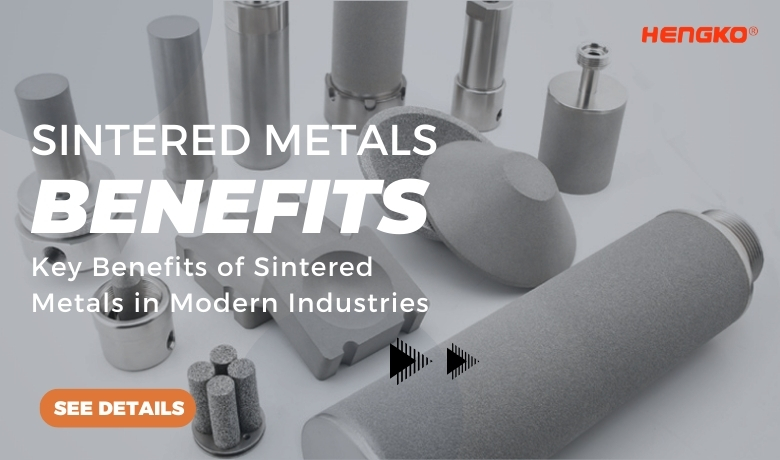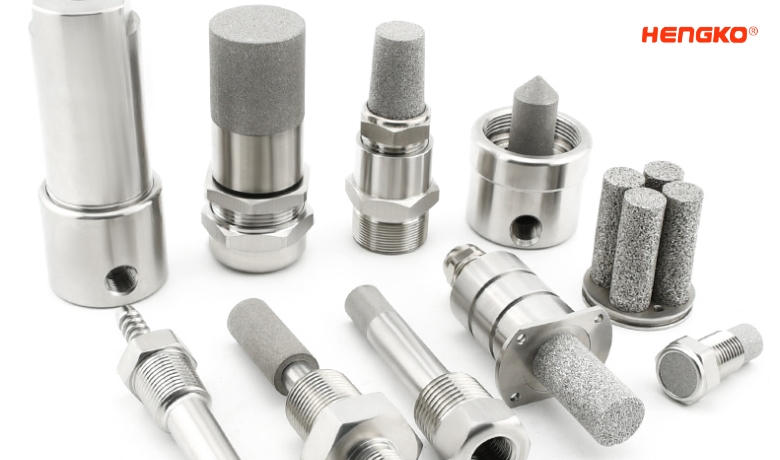
Sintered metals have become a crucial material in modern industries, known for their unique combination of durability,
cost-effectiveness, and adaptability.
They are used in a wide range of applications from filtration to noise reduction and purification.
Sintered metals are highly resistant to extreme conditions such as heat, pressure, and corrosion, providing reliable
solutions that perform under the toughest environments.
In this blog, we will explore the key benefits of sintered metals, including their advantages over traditional materials
like nickel and titanium alloys, and why they are the preferred choice across various industries.
Key Benefits of Sintered Metals:
*Superior Strength and Durability: Can withstand high temperatures, pressures, and corrosive environments.
*Cost-Effective: More affordable than specialized alloys like nickel and titanium while offering similar performance.
*Customizable: Allows for precise engineering with tailored pore sizes, densities, and shapes to meet specific application needs.
*High Resistance to Corrosion: Corrosion resistance can be customized based on alloy selection, making sintered metals ideal for harsh environments.
*Ideal for Filtration: Perfect for filtration applications in industries like chemical processing, oil and gas, and semiconductor manufacturing.
*Improved Performance in High-Pressure Systems: Sintered metal powders are durable and maintain their integrity under high pressure, making them ideal for gas filtration in industrial systems.
Here, we will break down these benefits and provide insight into why sintered metals are a leading choice in modern industrial applications.
What Is a Sintered Metal Filter Used For?
Sintered metal filters are widely used in applications where the material must withstand harsh conditions. These filters are found in industries like chemical processing, oil and gas, and semiconductor manufacturing. They are designed to trap particulate matter, remove contaminants from fluids, and maintain consistent flow rates even under high pressure and temperature conditions.
Why Are Sintered Metals So Robust?
Materials can crack under heat and stress, but sintered metals remain strong when other materials fail.
Sintered metals are created through powder metallurgy, a process where metal powder bonds under high heat. The result is a dense yet porous material that can withstand extreme temperatures, pressures, and corrosive environments. The sintering process fuses metal particles together without fully melting them, ensuring strength while maintaining permeability. This process offers better heat resistance than many polymers and can endure pressure fluctuations. Additionally, sintered metals are customizable by selecting alloys such as stainless steel or bronze to enhance corrosion resistance. For example, sintered filters replaced cast components in high-heat and acidic environments, lasting for years without failure, unlike the cast parts which deteriorated quickly.
Which Industries Benefit Most from Sintered Metals?
Sintered metals are essential in industries that require dependable components, including chemical, automotive, semiconductor, oil and gas, and HVAC industries. They are especially effective in various applications:
*Chemical plants: Sintered filters capture particles in corrosive liquids.
*Automotive systems: They ensure clean fuel and oil, improving engine efficiency.
*Semiconductor manufacturing: Sintered filters remove contaminants from ultra-pure gases and liquids.
*Oil and gas: Sintered metals withstand high pressure and abrasive flow.
*HVAC and acoustics: Sintered parts are used for sound dampening and airflow regulation.
These industries often need custom alloys and pore sizes tailored to meet specific demands.
I work closely with engineers to design components that meet these requirements and
adhere to necessary cleanliness and certification standards.
Is Sintered Metal Stronger?
Yes, sintered metals are generally stronger than many other materials due to the high-temperature bonding of metal particles.
This creates a robust matrix that can handle significant stress, pressure, and heat. The strength of sintered metals can be further
customized by choosing specific alloys and adjusting the sintering conditions.

What Are the Disadvantages of Sintering?
Sintering does have some drawbacks, such as the potential for residual porosity in the final product, which can reduce strength and leak resistance. The process is also limited by the types of metals that can be sintered, as some may require specific conditions or advanced techniques. Additionally, sintering can be time-consuming and demands precise control to avoid defects.
What Are the Problems with Sintering?
Some issues with sintering include the possibility of uneven density in parts, which can impact strength and performance. Sintered parts may also have surface defects or internal voids that reduce functionality. Achieving precise dimensional accuracy is another challenge, especially for complex or intricate shapes.
What Are Some of the Reasons Why a Controlled Atmosphere Furnace Is Desirable in Sintering?
A controlled atmosphere furnace is essential in sintering because it allows precise temperature and environmental control throughout the process. This ensures uniform heating and prevents oxidation or contamination of the metal during bonding, resulting in higher-quality and more reliable sintered parts.
Why Are Surface Filter Media Made of Sintered Metal Powders Used in High-Pressure Systems?
Sintered metal powders are ideal for high-pressure systems because they form strong, durable filters that resist deformation under pressure. Their porous structure allows for efficient filtration while maintaining integrity even under high pressure, making them particularly effective for gas filtration in industrial systems.
What Are the Disadvantages of Sintered Glass Filters?
While sintered glass filters work well in many applications, they have certain limitations. They are more fragile than metal filters, making them prone to breaking under stress or impact. Additionally, sintered glass filters have limited temperature resistance and may degrade faster when exposed to extreme conditions or corrosive substances.
How Do Sintered Metals Compare to Nickel and Titanium Alloys?
Nickel and titanium alloys offer excellent corrosion resistance and strength, but they come at a significantly higher cost. In many cases, sintered metals can provide similar performance at a fraction of the cost.
While nickel and titanium alloys are ideal for extreme conditions, sintered metals offer a more affordable alternative without compromising on performance. I prioritize life cycle costs over just purchase price. Sintered parts often require less maintenance and are easier to replace, which makes them more cost-effective. In applications with highly aggressive chemicals, titanium may still be necessary, but for most uses, stainless steel or bronze sintered parts work well. Sintered metals also allow for complex shapes and graded porosity, reducing assembly requirements and making them the practical choice.
Does Sintering Increase Hardness?
Yes, sintering can increase the hardness of the material, especially when certain alloys are used. The sintering process promotes the bonding of particles, which enhances the material’s strength and hardness. The extent of hardness increase depends on factors such as the choice of metal, sintering temperature, and time.
How Does Customization and Design Flexibility Help Performance?
Off-the-shelf parts often fail to meet the specific needs of complex processes. Custom sintered components, however, provide precision engineering tailored to each application.
By controlling variables such as pore size, density, and shape, sintered metals can be designed to meet exact performance needs. For example, filters can have fine surfaces to trap small particles and coarse cores to support flow. This customization reduces the number of joints in a design, cutting down on potential leak paths. I can also create multi-layer or functionally graded parts that improve performance. This flexibility reduces machining and assembly requirements, providing an efficient and cost-effective solution for complex needs.
How Should You Implement and Care for Sintered Components?
Proper installation and maintenance are essential for ensuring the longevity and efficiency of sintered parts.
I follow a clear routine for installation and maintenance, ensuring proper sealing and avoiding sharp edges that can stress the parts. Regular cleaning and back-flushing of filters prevent clogging, while tracking pressure drops helps detect issues early. For harsh environments, I schedule inspections and use sensors to monitor pressure and temperature. Having spare parts on hand for critical systems reduces downtime, and I keep logs of any issues to improve future maintenance.
Conclusion
Sintered metals are durable, cost-effective, and highly customizable, making them ideal for a wide range of industrial applications where reliability is essential.
Post time: Aug-30-2025




